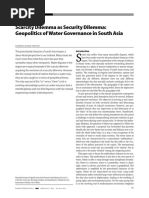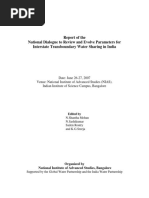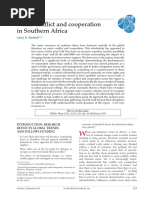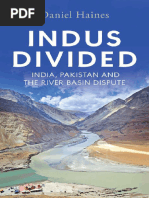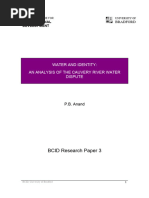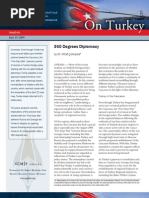0 ratings0% found this document useful (0 votes)
9 viewsFederalism and Interstate Water Disputes in India: A Study of The River Mahanadi
Federalism and Interstate Water Disputes in India: A Study of The River Mahanadi
Uploaded by
vaibhavi.raneCopyright:
© All Rights Reserved
Available Formats
Download as PDF, TXT or read online from Scribd
Federalism and Interstate Water Disputes in India: A Study of The River Mahanadi
Federalism and Interstate Water Disputes in India: A Study of The River Mahanadi
Uploaded by
vaibhavi.rane0 ratings0% found this document useful (0 votes)
9 views1 pageOriginal Title
3448ed95bedebca9c6d45a37e539d63e
Copyright
© © All Rights Reserved
Available Formats
PDF, TXT or read online from Scribd
Share this document
Did you find this document useful?
Is this content inappropriate?
Copyright:
© All Rights Reserved
Available Formats
Download as PDF, TXT or read online from Scribd
Download as pdf or txt
0 ratings0% found this document useful (0 votes)
9 views1 pageFederalism and Interstate Water Disputes in India: A Study of The River Mahanadi
Federalism and Interstate Water Disputes in India: A Study of The River Mahanadi
Uploaded by
vaibhavi.raneCopyright:
© All Rights Reserved
Available Formats
Download as PDF, TXT or read online from Scribd
Download as pdf or txt
You are on page 1of 1
Feature
Federalism and Interstate Water Disputes
in India: A Study of the River Mahanadi
BISHNUPRIYA PANDA AND SEEMA MALLIK
Indian federalism is unique in spirit and her practice of cooperative Introduction
federalism has placed her as a successful democratic state in the
world today. However, there are several lacunas in her federalism The lustre of federalism is derived from its ability to
with respect to the discourse on water disputes, which need to provide a platform to each unit of the government
be addressed. Although there are various constitutional provisions
apart from the statutory laws and obligations on the part of the to manoeuvre simultaneously without anyone’s
centre and the states, there is a significant growth in water dispute interest getting bottlenecked by another’s tight
cases in the country. The Mahanadi river water dispute between clutch. Honestly and not so strictly ‘federal’, the
the states of Odisha and Chhattisgarh is one such case. This
‘holding-together’ model of Indian federalism speaks
paper explores the significant issues in this dispute while drawing
insights from similar cases across the country. It also suggests a to ensuring that the state has the autonomy of
way forward in resolving river water disputes, given the importance granting efficient and vibrant governance while not
of river water, which is becoming a scarce commodity requiring ignoring regional diversity. Supported by a strong
just and fair management.
belief in the doctrine of power sharing between the
Centre and the states, India’s federalism has gone
quite a long way in encouraging policy-makers,
intelligentsia, academicians and researchers to
devote a remarkable portion of their attention towards
reckoning with its viability, existence, achievements
as well as some grey areas.
Indian federalism has been facing several
challenges like territorial disputes between states,
natural resource management and river water
disputes, to name a few. Rivers are the backbones
of every civilisation - all the great civilisations have
sprung on river banks. The immortal and inescapable
charisma of the rivers is not in doubt – they are one of
the greatest blessings of Mother Nature to mankind.
As narrated in our history as well as our folklore,
rivers have united people, establishing links between
them while surmounting the narrow territorial
cleavage. All rivers have their unique identity and
personality. Besides their economic and political
Bishnupriya Panda is a Doctoral Scholar in the Department significance, they hold cultural as well as religious
of Political Science, Utkal University and is also a faculty in the essence. Nevertheless, it is ironic that the life savers
Department of Political Science, Gopabandhu Science College,
Athgarh, Cuttack, Odisha, India. of millions are now struggling to live against those
they themselves have been serving since eternity.
Seema Mallik is faculty in the Department of Political Science,
Utkal University, Bhubaneswar, Odisha, India. River water disputes between states are an
increasing trend today, given the increasing scarcity
of river water and changing patterns of monsoons in
India. The Cauvery water crisis between Karnataka
and Tamil Nadu has taken a violent turn with bandhs
and protests in both states. The dispute surrounding
the distribution of Rabi-Beas river water between the
states of Punjab, Haryana and Rajasthan is another
DOI: https://doi.org/10.32381/PROD.2024.65.01.10
96 Federalism and Interstate Water Disputes in India: A Study of the River Mahanadi
You might also like
- Kalinago (Carib) Resistance To European Colonisation of The Caribbean Author(s) - HILARY McD. BECKLESDocument19 pagesKalinago (Carib) Resistance To European Colonisation of The Caribbean Author(s) - HILARY McD. BECKLESDionisio Mesye100% (3)
- J. Veneracion's Merit and Patronage Summary of KeypointsDocument15 pagesJ. Veneracion's Merit and Patronage Summary of KeypointsAron Capulong100% (1)
- Scarcity Dilemma As Security Dilemma: Geopolitics of Water Governance in South AsiaDocument6 pagesScarcity Dilemma As Security Dilemma: Geopolitics of Water Governance in South Asiasinghrekha9958No ratings yet
- Constitutional Law 22097Document14 pagesConstitutional Law 22097shrutidhoot22097No ratings yet
- International Water Law and Hydropolitics An Enquiry Into The Water Conflict Between India and NepalDocument24 pagesInternational Water Law and Hydropolitics An Enquiry Into The Water Conflict Between India and NepalHarsh VasaniNo ratings yet
- Inter-State Water DisputesDocument7 pagesInter-State Water DisputesKandlagunta Gayathri PraharshithaNo ratings yet
- pw125 Contested Waters Subnational Scale Water Conflict in PakistanDocument64 pagespw125 Contested Waters Subnational Scale Water Conflict in PakistanEman AnwarNo ratings yet
- Topic: Inter-State Water DisputesDocument5 pagesTopic: Inter-State Water DisputesKandlagunta Gayathri PraharshithaNo ratings yet
- River Water DisputesDocument14 pagesRiver Water DisputesvillenelliesNo ratings yet
- Between Kosi and Bihar Trapped Between T PDFDocument3 pagesBetween Kosi and Bihar Trapped Between T PDFABHIJEET KUMARNo ratings yet
- 255-Article Text-1184-1-10-20060620Document24 pages255-Article Text-1184-1-10-20060620Asim IshaqNo ratings yet
- Mohan Et Al 2007 - Report of The National Dialogue To Review and Evolve Parameters For Interstate Transboundary Water Sharing in IndiaDocument51 pagesMohan Et Al 2007 - Report of The National Dialogue To Review and Evolve Parameters For Interstate Transboundary Water Sharing in IndiaDschingis KhanNo ratings yet
- Kashmir and Water Conflict and CooperationDocument4 pagesKashmir and Water Conflict and CooperationEmílio Luís MendesNo ratings yet
- India's Lost Rivers and RivuletsDocument5 pagesIndia's Lost Rivers and RivuletsashishNo ratings yet
- Iel 1Document13 pagesIel 1Smita PandeyNo ratings yet
- Evs Water Pollution Mrityunjaya Thakur 1986Document31 pagesEvs Water Pollution Mrityunjaya Thakur 1986Gautam DohareyNo ratings yet
- Assignment 02: The India Pakistan Water DisputeDocument11 pagesAssignment 02: The India Pakistan Water DisputeAyeshá KhánNo ratings yet
- Report On IWTDocument86 pagesReport On IWTShehzad HaiderNo ratings yet
- Engaging with Water and Rivers from a Multispecies Justice Perspective, C. HouartDocument8 pagesEngaging with Water and Rivers from a Multispecies Justice Perspective, C. HouartpbullingressNo ratings yet
- Munawar Abbas, Ijaz Hussain, Saeed Ahmad, Asif Ali, Usama Javeed, Aqib Rasheed, Uzair Iqbal, Farukh Nawaz, Asif Shahzaid, Sadia BashirDocument8 pagesMunawar Abbas, Ijaz Hussain, Saeed Ahmad, Asif Ali, Usama Javeed, Aqib Rasheed, Uzair Iqbal, Farukh Nawaz, Asif Shahzaid, Sadia Bashirmunawar abbasNo ratings yet
- Water_Power_and_Identity_The_cultural_po-1-200Document200 pagesWater_Power_and_Identity_The_cultural_po-1-200carlos alberto moraesNo ratings yet
- Boelens Water Power and Identity the Cultural PoDocument389 pagesBoelens Water Power and Identity the Cultural Pocarlos alberto moraesNo ratings yet
- Water ConflitsDocument22 pagesWater Conflitsanisha vNo ratings yet
- Water ConflitsDocument22 pagesWater Conflitsanisha vNo ratings yet
- Indigenous Water GovernanceDocument8 pagesIndigenous Water GovernanceBryan Moses NyigzNo ratings yet
- Swatuk-2015Document16 pagesSwatuk-2015pariaNo ratings yet
- HK 1Document6 pagesHK 1Abhay DangashNo ratings yet
- Murthy-WaterConflictCooperation-2017Document56 pagesMurthy-WaterConflictCooperation-2017katkeldiev.caNo ratings yet
- TroubledWaters WiresWater57Aug282020Document19 pagesTroubledWaters WiresWater57Aug282020Khánh Linh Nguyễn ThịNo ratings yet
- TragedyofCommons ExperienceofRiverLinkinginKeralaDocument80 pagesTragedyofCommons ExperienceofRiverLinkinginKeralac_surendranathNo ratings yet
- Indus Divided India, Pakistan and The River Basin Dispute by Daniel HainesDocument179 pagesIndus Divided India, Pakistan and The River Basin Dispute by Daniel HainesSeu Madruga MadrugaNo ratings yet
- Investing Upstream Watershed Protection in Piura, PeruDocument9 pagesInvesting Upstream Watershed Protection in Piura, PerujennyferNo ratings yet
- Ir Research PaperDocument7 pagesIr Research Paperprisha dograNo ratings yet
- Water: An Engineering Perspective of Water Sharing Issues in PakistanDocument14 pagesWater: An Engineering Perspective of Water Sharing Issues in PakistanWaqas SaeedNo ratings yet
- Conflicts River EpwDocument5 pagesConflicts River EpwMuralidharan ArdhanareswaranNo ratings yet
- ... BIKSHAM - 'Million Revolts' in The MakingDocument6 pages... BIKSHAM - 'Million Revolts' in The MakingKatarína MlichováNo ratings yet
- Complete Download Federalism and Inter State River Water Disputes in India 1st Edition Ranjan PDF All ChaptersDocument67 pagesComplete Download Federalism and Inter State River Water Disputes in India 1st Edition Ranjan PDF All Chaptersnesosualey100% (1)
- Prospects of Rainwater Harvesting in IndiaDocument11 pagesProspects of Rainwater Harvesting in IndiaSameer sayedNo ratings yet
- ConservatSoc 2010 8 3 182 73807Document16 pagesConservatSoc 2010 8 3 182 73807Rajasekhar TalluriNo ratings yet
- Water Resources 1Document11 pagesWater Resources 1api-3757108No ratings yet
- Challenges of Char People in Northern Bangladesh A Study On Dimla, NilphamariDocument10 pagesChallenges of Char People in Northern Bangladesh A Study On Dimla, NilphamariInternational Journal of Innovative Science and Research TechnologyNo ratings yet
- How To Keep Rivers Clean in IndiaDocument10 pagesHow To Keep Rivers Clean in IndiaThe United IndianNo ratings yet
- Land Use Policy: Sumit Vij, Vishal NarainDocument8 pagesLand Use Policy: Sumit Vij, Vishal NarainPagla Chulke NeNo ratings yet
- 2129 Words Essay On Water Crisis in India PDFDocument6 pages2129 Words Essay On Water Crisis in India PDFPriyanshu KumarNo ratings yet
- Indus Divided - India, Pakistan and The River Basin DisputeDocument60 pagesIndus Divided - India, Pakistan and The River Basin DisputeAzan RazaNo ratings yet
- Water Colonialism and Indigenous Water Justice in South-Eastern AustraliaDocument35 pagesWater Colonialism and Indigenous Water Justice in South-Eastern AustraliaKaterina BlackNo ratings yet
- Water Resourecs and Gender, Caste and ReligionDocument10 pagesWater Resourecs and Gender, Caste and Religionliwoc16551No ratings yet
- AssignmentDocument9 pagesAssignmentSanjayNo ratings yet
- Anand 2004 - WATER AND IDENTITYDocument41 pagesAnand 2004 - WATER AND IDENTITYDschingis KhanNo ratings yet
- Rai 2016Document16 pagesRai 2016subashNo ratings yet
- Water 15 00803 v2Document28 pagesWater 15 00803 v2diribaNo ratings yet
- Water IssuesDocument18 pagesWater IssuesraesaNo ratings yet
- The Mullaperiyar Inter-Basin Water Transfer, Water Con Icts, and Dam SafetyDocument54 pagesThe Mullaperiyar Inter-Basin Water Transfer, Water Con Icts, and Dam SafetyArun ArunNo ratings yet
- Article RespondingDocument17 pagesArticle RespondingTooba ZaidiNo ratings yet
- Aec AssignmentDocument7 pagesAec AssignmentNishita chaudharyNo ratings yet
- 21 Nandita SinghDocument12 pages21 Nandita Singharnav saikiaNo ratings yet
- Water, The Sacred and The Commons of Rajasthan - A Review of Anupam Mishra's Philosophy of WaterDocument25 pagesWater, The Sacred and The Commons of Rajasthan - A Review of Anupam Mishra's Philosophy of WatervarishavipashaNo ratings yet
- Cohen - Riverkin Seizing The Moment To Remake Vital Relations in The United Kingdom and BeyondDocument16 pagesCohen - Riverkin Seizing The Moment To Remake Vital Relations in The United Kingdom and BeyondOyanis AravNo ratings yet
- PUBLISHEDJOURNALIJHSSUPTDocument7 pagesPUBLISHEDJOURNALIJHSSUPTKEVIN AUDRYC HERDITYANo ratings yet
- PH.D Research ProposalDocument12 pagesPH.D Research ProposalDr AnwarNo ratings yet
- Lipski 2005Document374 pagesLipski 2005Mitosis Emite100% (2)
- National Bolshevism in Weimar Germany PDFDocument31 pagesNational Bolshevism in Weimar Germany PDFvikki pettiNo ratings yet
- Memorandum of AgreementDocument5 pagesMemorandum of AgreementJayson AbreraNo ratings yet
- Timeline of Philippine HistoryDocument11 pagesTimeline of Philippine HistoryXardNo ratings yet
- Conversos Versus Recusants Shaping The M PDFDocument28 pagesConversos Versus Recusants Shaping The M PDFPedro Escobar FernándezNo ratings yet
- Social Identity Theory ChapterDocument4 pagesSocial Identity Theory ChaptersmrithiNo ratings yet
- Past Paper Part 17Document12 pagesPast Paper Part 17kppsccandidatesNo ratings yet
- Pop Quiz On BullyingDocument4 pagesPop Quiz On BullyingJhonny BravoNo ratings yet
- Hawaiian-Philco vs. Gulmatico 238 S 181Document1 pageHawaiian-Philco vs. Gulmatico 238 S 181Liezl BoholNo ratings yet
- Nyerere in The Eyes of His CriticsDocument11 pagesNyerere in The Eyes of His CriticsEvarist ChahaliNo ratings yet
- ACS Rules 1974Document13 pagesACS Rules 1974Aziz MalikNo ratings yet
- Sundown Slaying of Carol JenkinsDocument8 pagesSundown Slaying of Carol Jenkinstastefulbaby1851No ratings yet
- LINKLATER, Andrew (2021) - The Idea of Civilization and The Making of The Global Order - Cap 7Document38 pagesLINKLATER, Andrew (2021) - The Idea of Civilization and The Making of The Global Order - Cap 7Ouvinte de Bom GostoNo ratings yet
- Martin Luther King - 64379Document3 pagesMartin Luther King - 64379Gabriela RochinNo ratings yet
- Good GovernanceDocument6 pagesGood Governancesyeda ramsha100% (1)
- Curriculum Vitae: Post of Apply For Driver Career ObjectiveDocument2 pagesCurriculum Vitae: Post of Apply For Driver Career ObjectiveNasir AhmedNo ratings yet
- Praja Mandal MovementDocument15 pagesPraja Mandal MovementArunNo ratings yet
- 360 Degrees DiplomacyDocument3 pages360 Degrees DiplomacyGerman Marshall Fund of the United StatesNo ratings yet
- Term PapersDocument130 pagesTerm PapersCasio Je-urNo ratings yet
- KristaDocument7 pagesKristaJannah AbanicoNo ratings yet
- Slavery and The 8 VeilsDocument3 pagesSlavery and The 8 VeilsZurich FilesNo ratings yet
- Gakuru Feared For His Life', Reveals Successor: Starehe Poll Loser Alleges Vote Stuffing in PetitionDocument1 pageGakuru Feared For His Life', Reveals Successor: Starehe Poll Loser Alleges Vote Stuffing in PetitionromwamaNo ratings yet
- Grade 1 English LanguageDocument13 pagesGrade 1 English Languageachiniwithanage9No ratings yet
- HISP1007 S2Essay 2748295mafaldaDocument7 pagesHISP1007 S2Essay 2748295mafaldaannieNo ratings yet
- Third Philippine RepublicDocument3 pagesThird Philippine RepublicYessenia MontillaNo ratings yet
- 85E-A Version PDFDocument8 pages85E-A Version PDFSeema KoreNo ratings yet
- Fever Between Past and The FutureDocument2 pagesFever Between Past and The FutureHammad RazaNo ratings yet


